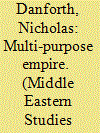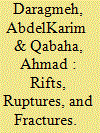|
|
|
Sort Order |
|
|
|
Items / Page
|
|
|
|
|
|
|
| Srl | Item |
| 1 |
ID:
131463


|
|
|
|
|
| Publication |
2014.
|
| Summary/Abstract |
This article examines popular, academic and political perceptions of the Ottoman Empire in Republican Turkey, challenging the widespread assumption that there has been a continuous clash between pro-Ottoman Islamists and secular, anti-Ottoman, Kemalists. It argues that in the Republican period Kemalists effectively appropriated the Ottoman past for use in their nationalist narrative, not only through using a 'theory of fatal decline' but also by simply defining positive cultural or political symbols from the years 1299 to 1923 as 'Turkish' rather than 'Ottoman'. This serves as a backdrop for the article's main argument, that the 1940s and 1950s saw a thorough Kemalist appropriation of the Ottoman past, celebrating the empire's golden age as secular, pro-western and Turkish. The 500th anniversary of the conquest of Istanbul in 1953 gave the Turkish government an opportunity to showcase this new interpretation of Ottoman history as well as to use the relatively new rhetoric of 'Ottoman tolerance' to claim for Turkey a place among its new allies in the democratic, anti-communist West. At the level of domestic politics, the Democratic Party sought to wrap its modernization policies in the mantle of a progressive, democratic Fatih Sultan Mehmet II, while the Republican People's Party condemned the Democrats for betraying Fatih's memory and the nation's honour by downplaying the Ottoman past in order to placate potential anti-communist allies in Greece and the Arab world. Ultimately, the article argues that it is impossible to understand contemporary Islamist and liberal uses of the Ottoman past without understanding the way the empire was incorporated into the dominant Turkish nationalist narrative between 1923 and 1953
|
|
|
|
|
|
|
|
|
|
|
|
|
|
|
|
| 2 |
ID:
173126


|
|
|
|
|
| Summary/Abstract |
This article responds to the relative neglect of reading Mahmoud Darwish from a postmodern perspective. Inspired by postmodern theory, we suggest that Darwish after Oslo agreements in 1993 seeks to have a displaced and dialectical encounter with the collective identity; he utilizes a transition from being into becoming, from filiation into affiliation, knowing that this transition mirrors rifts, ruptures, and fractures in the Palestinian historical and geopolitical conditions in the post-Oslo era. By looking at poems written after the Oslo Accords, which were described by Bashir Abu-Manneh as “the root cause of the disintegration and liquidation of Palestinian agency,” we argue that Darwish's persona manifests the postmodern intellectual who is tempted to leave the collective and expatriate himself to hone an independent self and thought that provides a fresh perspective and a new understanding of Palestinian collectivity. While Darwish's pre-Oslo poetry expressed a collective voice, identification, and commitment to the national narrative, after Oslo, he gets more personal and, perhaps, detached from and critical of the nationalist political entities and narratives. Building on theoretical insights from both postcolonial and postmodern intellectuals, we also articulate ways in which the dialectical relation between postcolonialism and postmodernism appears in Darwish's poetry. We find that the persona at times combines, and at other times, fluctuates between, singularity and multiplicity, certainty and suspicion, the collective and the personal, place and space, tradition and innovation, while seeking revision, transition, contingency, dynamism, fluidity in the contemporary, post-Oslo time.
|
|
|
|
|
|
|
|
|
|
|
|
|
|
|
|
|
|
|
|
|